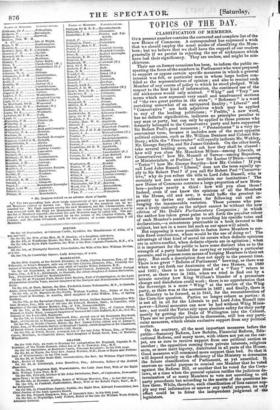TOPICS OF THE DAY.
• CLASSIFICATION OF MEMBERS.
OUR present number contains the corrected and complete Est of the new House of Commons. A correspondent has expressed a wish that we should employ the usual modes of classifying the Mem- bers ; but we believe that we shall have the support of our readers generally if we persist in rejecting the use of nicknames which have lost their significancy. They are useless, and might be mis- chievous.
Their use on former occasions has been, to inform the public re- specting the force of the numbers in Parliament who were prepared to support or oppose certain specific measures in which a general interest was felt, or particular men in whom large bodies con- fided as the representatives of opinion ,• and also to remind each Member of any course of policy to which he stood pledged. With respect to the first kind of information, the continued use of the old nicknames would only mislead. " Whig" and "Tory " are terms which now represent very small and unadvanced sections of " the two great parties in the state"; " Reformer " is a word partaking somewhat of an antiquated finality; "Liberal" and " Conservative " are both adjectives which may be applied to any of the leading politicians ; " Peelite," a new word, has no definite signification, indicates no principles peculiar to any man or party, but can only be applied to those persons who formerly belonged to the Conservative party and have supported Sir Robert Peel's good measures ; " Protectionist " is a very in- convenient term, because it includes men of the most opposite political opinions, such as Mr. William Denison and Colonel Sib- thorp ; while the " Free-trader " will equally indicate Mr. Wakley, Mr. George Smythe, and Sir James Graham. On the other hand, take several leading men and ask how they shall be classed :
how will you class Mr. men, Milnes—among Liberals, or Conservatives ? how Mr. Monsell of Tervoe—among Repealers, or Ministerialists or Peelites? how Sir Lucius O'Brien—among "Tories"? how kr. George Smythe—how Mr. Cobden ? If you call Lord John Russell "Liberal," does not the term equally ap- ply to Sir Robert Peel ? if you call Sir Robert Peel "Conserva- tive," why do you refuse the title to Lord John Russell, who is certainly not less anxious to maintain our institutions? The new House of Commons contains a large proportion of new Mem- bers—perhaps nearly a third : how will you class those Indeed, even if one knew the opinions of all the Members in the House, old and new, it would baffle the greatest in- genuity to devise any scheme for following out and ar- ranging the innumerable varieties. Those persons who pos- sess a lively curiosity on the subject cannot be without the new edition of Mr. Dodd's Parliamentary Companion ; in which the author has taken great pains to set forth the peculiar colour of each Member's sentiments by recording his specific votes and declarations,—a minuteness practicable in a book devoted to the subject, but not in a mere list such as our space will admit.
But supposing it were possible to fasten down Members to cer- tain fixed conclusions where would be the use of doing so? The advantage of that kind of moral tie occurs when definite opinions are in active conflict, when definite objects are in agitation ; when it is important for the public to have some distinct idea as to the strength of a party banded for carrying or resisting a particular measure, and to possess some means of keeping Members to their set duty. But such a description does not apply to the present time. There is no great "Reform of Parliament" brewing, as there was when we put forth our Anatomies of the two Houses, in 1880 and 1832; there is no intense dread of a " Tory. " return to power, as there was in 1835 when we tried to find out by a minute scrutiny how King William's blunder of a premature change and dissolution could work ; there is no apprehension that the Sovereign is a mere " Whig " at the service of the Whir party, as there was at the accession in 1887; and finally, there is no Ministry to be formed, as in 1841, for the reconsideration of the Corn-law question. Parties no longer cohere as parties : it is not all in all for the Liberals to put Lord John Russell into power—Liberal measures can now be had without WhigMinis- ters ; nor could the Tories rely upon absolute safety for their party merely by getting the Duke of Wellington into the Cabinet. There are no particular policies in discussion, still leas any parti- cular measures, which obtain exclusive support from any political section.
On the contrary, all the most important measures before the public—Sanatory Reform, Law Reform, Financial Reform, Edu- cational Reform, and many more, with others not yet on the car- pet, are as sure to receive support from one political section as another ; the opposition coming from private interests, religious sects, or mere inert bigotry, distributed in all parts of the House. Good measures will command more support than bad. So that it will depend mainly on the efficiency of the Ministry to determine the future classification of Parliament, as yet unsettled. It answers no useful purpose to remind one Member that he voted against the Reform Bill, or another that he voted for the Corn- laws, at a time when the general opinion ratifies the judicious de- termination of so many Members to vote not according to old party precedents but according to the merits of the questions be- fore them. While, therefore, such classification of lists cannot sup- ply any real information or answer any useful purpose, its only effect could be to fetter the independent judgment of the legislators.


























 Previous page
Previous page